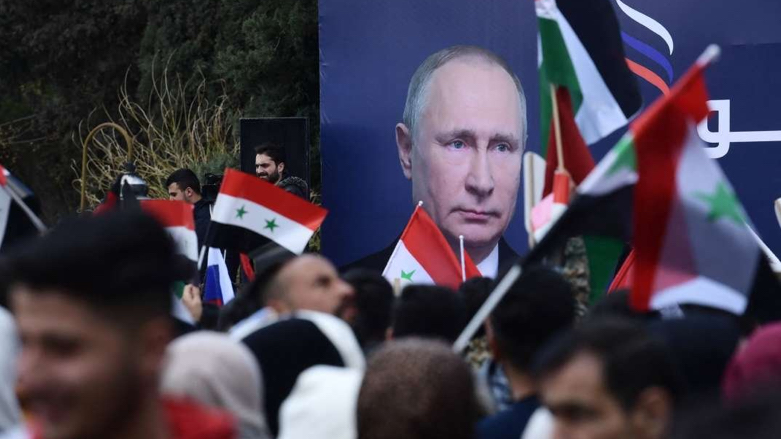Syrian troops to join fight in Ukraine, as Russian offensive falters

WASHINGTON DC, United States (Kurdistan24) – Syrian soldiers have begun leaving their home bases to support Russian troops in Ukraine, The New York Times reported on Friday, as Moscow faces mounting casualties in an invasion gone badly awry.
It would appear that the Ukraine crisis has emboldened Russian allies in the region, especially Iran and Syria. Perhaps Moscow has a greater need for them because of the Ukraine conflict. Perhaps Russian brutalities in Ukraine have given license to greater acts of aggression elsewhere. Or, perhaps, there is some other reason.
On March 13, Iran launched an unprovoked ballistic missile attack on Erbil—which Luxemburg’s Foreign Minister, denounced on Saturday as “an act of war,” while visiting the Kurdistan Region.
Syria apparently helped ISIS in its startling Jan. 20 assault on the Hasakah prison in Kurdish-controlled northeast Syria. Notably, the assault followed the Kurds’ rejection of Damascus’ latest effort to press them into negotiations.
Read More: Ukraine Crisis: Implications for the Middle East, including the US, Rojava, and the Kurdistan Region
Considering these recent attacks, when some group carries out an assault beyond that which it seems capable of, there is an obvious answer to the question of how they could do it. And that answer is: They had help.
To find out who helped them, one may only need to answer the simplest of questions: “Cui bono?” – Who benefits?
Syrian, Iranian Support for Ukraine-Bound Fighters
The deployment of Syrian troops to Ukraine is reciprocity for the deployment of Russian forces to Syria. Starting in the fall of 2015, Russia began its military support of the Bashar al-Assad regime. That succeeded in preventing the fall of the regime and in helping Assad to recover control over most of the country.
Damascus, which still relies on Russian military support, is thus under a significant obligation to Moscow. In addition, Syrian troops now have experience working with Russians, including overcoming language barrier issues. Presumably, some component of the Syrian military speaks Russian and vice-versa. Such experience fighting together will, presumably, facilitate the coordination of their forces in Ukraine.
“A first contingent of [Syrian] soldiers has arrived in Russia for military training, before heading to Ukraine,” the Times reported, citing two sources: a Western diplomat and “a Damascus-based ally of the Syrian government.”
The soldiers are members of an elite Syrian Army unit: the 25th Division, known as the “Tiger Forces.” The unit has worked closely with Russian officers in Syria.
In addition, Iran appears to have developed something of a ‘Shi’ite Internationale,’ which it is making available to Moscow.
Shi’ites from several countries were mobilized to fight alongside Russians in Syria’s civil war, the Times said. They include Iraqi and Lebanese men, recruited, at least initially, by Iran. Iran is also fighting to support Assad in Syria, under the command of its Islamic Revolutionary Guard Corps (IRGC.)
A militia commander, whose forces include “fighters from Syria and neighboring countries”, told the Times that “his group had sent another contingent of 85 men to Russia” and “more were on the way.”
“The Russians helped us when we needed it, and now it’s time to give back part of what they offered us,” he said.
Moscow offers the troops of an elite unit, like the 25th Division, $1,200 a month for six months, along with a $3,000 bonus at the end of their contract. Compared to the $100 a month they would receive in the Syrian army, the financial rewards are great.
In addition, if they are killed in combat, their families will receive $2,800 and $600 per month thereafter for a year.
Individuals sent to fight with the Russians must be first vetted by the Syrian security services.
Heavy Russian Losses, Poor Army Performance, Low Morale
Putin and his commanders expected to capture the Ukrainian capital of Kiev and overthrow the government in a matter of days, but the war has instead entered its fifth week.
The poor performance of the Russian army has surprised even Western observers. NATO has estimated that as many as 15,000 Russian troops may have died during the first month of the war.
Making matters worse, the stalled Russian offensive has placed an unanticipated emphasis on logistics: the resupply of troops with food, fuel, and other basic supplies.
“Russia’s weaknesses in logistics—the tail of support and services that enable combat forces to live, move, communicate and fight—were evident just days” after the assault began, The Wall Street Journal reported on Friday.
Logistics have been a long-standing challenge for Moscow, and “Russia’s military doesn’t seem to have overcome many of the logistical problems suffered by the Red Army” in Soviet times, the Journal said.
In one clear sign of their deficiencies, Russian forces often communicate on unsecured devices, and those communications can be intercepted and monitored.
According to British intelligence, morale among Russian forces is low. Soldiers are refusing orders and even sabotaging their own equipment.
Yet Putin appears determined to press on—hence the Russian need for additional manpower.
Moscow is moving forces into Ukraine from other theaters, including Georgia, where Russia fought a war in 2008. In Georgia, Russia has recognized, and supported break-away regions.
“Russia is redeploying thousands of troops in Georgia to boost its flagging forces in Ukraine,” the Independent reported on Friday. It is “highly unlikely” that Moscow would take such a step unless the Russian army had suffered “unexpected losses” in Ukraine, Britain’s Ministry of Defense said.
It is in these apparent dire straits that Moscow seeks support from Middle Eastern fighters. It may well be a sign of desperation in Moscow, but it is hoped that the experience the Middle Eastern fighters have gained in regional conflicts will provide some of the skills they will need in Ukraine.
